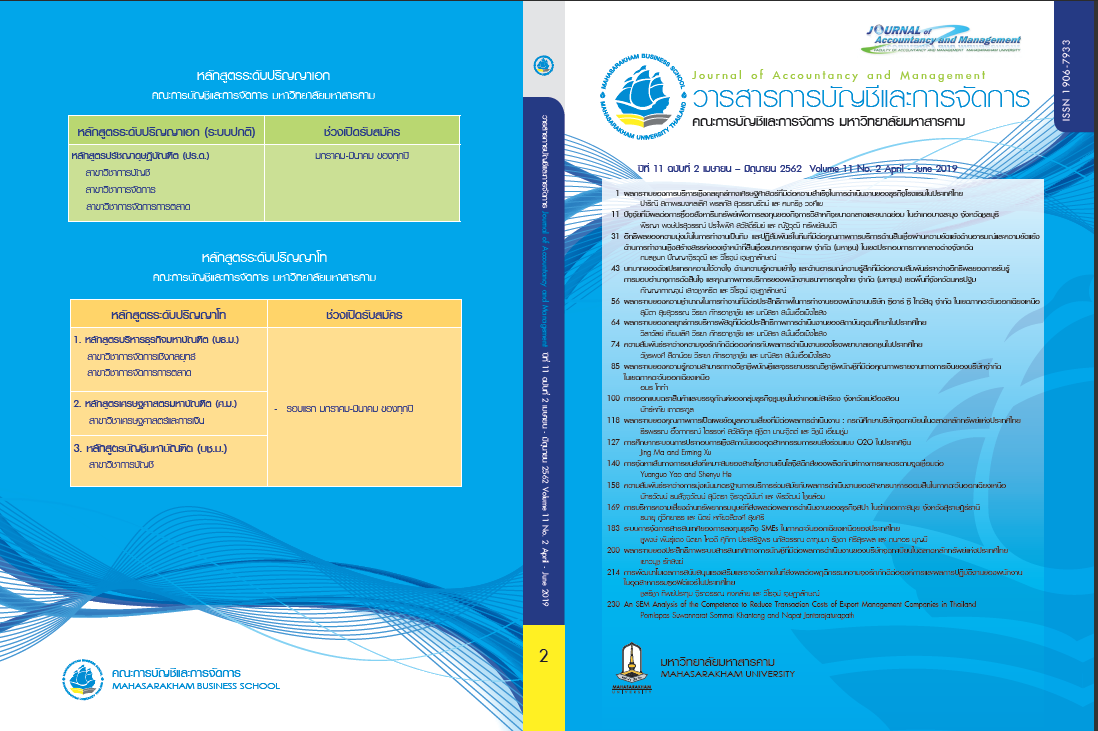ผลกระทบของการบริหารเชิงกลยุทธ์ทางเศรษฐศาสตร์ที่มีต่อ ความสำเร็จในการดำเนินงานของธุรกิจโรงแรมในประเทศไทย
Main Article Content
บทคัดย่อ
การวิจัยครั้งนี้มีวัตถุประสงค์ เพื่อทดสอบผลกระทบของการบริหารเชิงกลยุทธ์ทางเศรษฐศาสตร์
ที่มีต่อความสำเร็จในการดำเนินงานของธุรกิจโรงแรมในประเทศไทย กลุ่มตัวอย่างเป็นผู้บริหารของธุรกิจโรงแรม จำนวน 106 คน โดยใช้แบบสอบถาม สถิติที่ใช้ในการวิเคราะห์ข้อมูล ได้แก่ การวิเคราะห์สหสัมพันธ์แบบพหุคูณ
และการวิเคราะห์ความถดถอยแบบพหุคูณ ผลการวิจัยพบว่า การบริหารเชิงกลยุทธ์ทางเศรษฐศาสตร์โดยรวม
ด้านการจัดสรรทรัพยากร ด้านต้นทุนค่าเสียค่าโอกาส และด้านเป้าหมายทางธุรกิจ มีความสัมพันธ์และผลกระทบ
เชิงบวกกับความสำเร็จในการดำเนินงาน ด้านการเงิน ด้านลูกค้า ด้านกระบวนการภายใน และด้านการเรียนรู้และพัฒนาการ ดังนั้น ธุรกิจโรงแรม ควรให้ความสำคัญเกี่ยวกับการจัดสรรทรัพยากรที่มีอยู่อย่างจำกัดภายในองค์กร
ให้เกิดประโยชน์สูงสุด เพื่อลดต้นทุนในการผลิตและบริการ นอกจากนี้การทำการตัดสินใจเลือกเป้าหมายทางธุรกิจต่างๆ ควรมีการศึกษาทางเลือก และคำนวณต้นทุนค่าเสียโอกาสก่อนตัดสินใจ เพื่อหาหนทางที่จะทำให้องค์กร
เกิดประโยชน์สูงสุด
Downloads
Article Details
บทความที่ได้รับการตีพิมพ์เป็นลิขสิทธิ์ของวารสารการบัญชีและการจัดการ
ข้อความที่ปรากฏในบทความแต่ละเรื่องในวารสารวิชาการเล่มนี้เป็นความคิดเห็นส่วนตัวของผู้เขียนแต่ละท่านไม่เกี่ยวข้องกับมหาวิทยาลัยมหาสารคาม และคณาจารย์ท่านอื่นๆในมหาวิทยาลัยฯ แต่อย่างใด ความรับผิดชอบองค์ประกอบทั้งหมดของบทความแต่ละเรื่องเป็นของผู้เขียนแต่ละท่าน หากมีความผิดพลาดใดๆ ผู้เขียนแต่ละท่านจะรับผิดชอบบทความของตนเองแต่ผู้เดียว
เอกสารอ้างอิง
การท่องเที่ยวแห่งประเทศไทย. (2560). ที่พัก. ค้นเมื่อ 2 กุมภาพันธ์ 2560, จาก https://thai.tourismthailand.org/ที่พัก
จิตตินันท์ นันทไพบูลย์. (2555). ธุรกิจโรงแรม. กรุงเทพฯ: ซีเอ็ดยูเคชั่น.
ธนาคารแห่งประเทศไทย. (2559). เครื่องชี้ภาวะการท่องเที่ยว. ค้นเมื่อ 6 มิถุนายน 2561,
จาก http://www2.bot.or.th/statistics/ReportPage.aspx?reportID=624
บุญชม ศรีสะอาด. (2553). การวิจัยเบื้องต้น (7th ed.). กรุงเทพฯ: สุวีริยาสาส์น.
พสุ เดชะรินทร์. (2548). Balanced Scorecard รู้ลึกในการปฏิบัติ. กรุงเทพฯ: โรงพิมพ์แห่งจุฬาลงกรณ์มหาวิทยาลัย.
ศูนย์วิจัยกสิกรไทย. (2559). ตลาดต่างชาติเที่ยวไทยปี 2559 ยังเติบโต...หันเน้นตลาดคุณภาพสร้างรายได้ที่ยั่งยืน.
สำนักงานปลัดกระทรวงการท่องเที่ยวและกีฬา. (2561). สถานการณ์การท่องเที่ยวโลก รายงานภาวะเศรษฐกิจท่องเที่ยว.
สำนักงานเศรษฐกิจอุตสาหกรรม. (2558). สรุปภาวะเศรษฐกิจอุตสาหกรรมปี 2558 และแนวโน้มปี 2559.
สำนักยุทธศาสตร์และการวางแผนเศรษฐกิจมหภาค. (2559). ภาวะเศรษฐกิจไทยไตรมาสที่สี่ และแนวโน้มปี 2559-2560, 3.
สุจินดา เจียมศรีพงษ์. (2554). เศรษฐศาสตร์ธุรกิจ. กรุงเทพฯ: โรงพิมพ์แห่งจุฬาลงกรณ์มหาวิทยาลัย.
Aaker, D. A., Kumar, V., & Day, G. S. (2004). Marketing research. John Wiley & Sons.
Black, K. (2006). Business statistics: for contemporary decision making. John Wiley & Sons.
Ionită, D. (2013). Success and Goals: An Exploratory Research in Small Enterprises. Procedia Economics and Finance,
6(13), 503–511
Mariadoss, B. J., Johnson, J. L., & Martin, K. D. (2014). Strategic intent and performance: The role of resource
allocation decisions. Journal of Business Research, 67(11), 2393–2402.
Nunnally, J. C., & Ira, H. B. (1978). Psychometric theory. New York: McGraw-Hill.
Nunnally, J. C., & Bernstein, I. H. (1994). Psychological theory. New York, NY: MacGraw-Hill.
Puciato, D. (2016). Attractiveness of municipalities in South-Western Poland as determinants for hotel chain
investments. Tourism Management, 57, 245–256.
Pun, K. F., & White., A. S. (2005). A Performance Measurement Paradigm for Integrating Strategy Formulation.
International Journal of Management Reviews, 7(1), 49–71.
Thorne, F. S. (2005). Analysis of the competitiveness of cereal production in selected EU countries.
Rural Economy Research Centre, Teagasc, Dublin, Ireland, 16.


